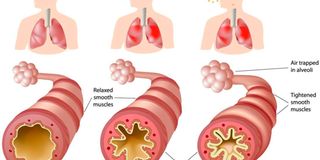Asthma Triggers: Top 8 causes of asthma attacks

Medications such as beta-blockers used to treat high blood pressure and heart conditions can trigger an asthma attack.
What you need to know:
- Anything that can cause an allergic reaction in your body is classified as an allergen.
- When you breathe in cold air, it can irritate your lungs and cause the muscles around your airways to constrict.
- Similar to cold air, cold foods and drinks trigger or worsen symptoms of asthma.
If you're one of the millions of people around the world who suffer from asthma, then you know that every day is a battle against your disease. You also know there are certain things that can trigger an asthma attack, which can make your life a lot more difficult. The triggers usually differ from one person to another depending on genetics, type of asthma, and sometimes, the environment.
Understanding these triggers helps you identify what to avoid so that you don’t get asthma attacks. This is essential to managing symptoms and asthma attacks.
Allergens
Anything that can cause an allergic reaction in your body is classified as an allergen. Allergens are a very common trigger of asthma attacks. If you have allergies, then you're likely to have asthma as well. Allergens can be anything from pollen and dust mites to mold and animal fur. The products you use at homes such as perfumes, air fresheners, and make-up products can be allergens. When these things come into contact with your lungs, they can cause an allergic reaction that leads to an asthma attack.
Cold air
Asthma is often triggered by cold air. When you breathe in cold air, it can irritate your lungs and cause the muscles around your airways to constrict. This can make it difficult to breathe and may lead to an asthma attack. For this reason, asthmatic people are advised to stay warm and avoid cold areas.
Exercise
Exercise is good for your overall health, but it can be a trigger for some asthmatic people. When you exercise, you breathe faster and deeper, which gives your respiratory system a short time to warm the air sufficiently. Exercise-related asthma attacks are quite common but can be managed. Learn to warm up properly before your workout sessions. Done properly, exercising is a useful tool in the management of asthma.
Smoke
Smoke from cigarettes, cigars, and pipes is one of the most common triggers of asthma. Smoke irritates your airways and can cause them to constrict. If you have asthma, it's best to avoid smoking altogether. If you can't avoid being around smokers, make sure the room you are in is well ventilated.
Also, avoid cooking stoves that emit lots of smoke e.g., paraffin stoves, and firewood. If you must use either, use them either outdoors or in a well-ventilated room.
Some Foods and Drinks
Certain foods have been known to trigger asthma attacks. These include sulphites found in dried fruits, pickled vegetables, beer, and wine. Other food items that may trigger an attack are preservatives such as benzoates, MSG, and some colourings. All these are found in processed foods.
Similar to cold air, cold foods and drinks trigger or worsen symptoms of asthma. Unless during hot weather, asthmatics who are sensitive to cold are advised against cold or chilled foods and drinks.
Cockroaches and other vermin
Cockroaches are known to trigger asthma, especially in children. They do this by leaving their droppings around the house, which contain a protein that can cause an allergic reaction. Other vermin such as rodents and birds can also cause asthma attacks in a similar manner. Other than droppings, the vermin also bring and store their foods in hidden places within the house. The foods may contain allergens as they are or cause a strong odour that can trigger an asthma attack.
Strong emotions
When you experience strong emotions such as anxiety, fear, crying, or laughter, it can lead to an asthma attack. These emotions can cause your airways to constrict, making it difficult to breathe. Mental conditions such as depression and stress have also been found to cause asthmatic reactions in some people. It's important to stay calm and avoid stressful situations if you have asthma.
Some medications
Some medications such as beta-blockers used to treat high blood pressure and heart conditions can trigger an asthma attack. Common medications such as aspirin and diclofenac can also trigger allergic reactions in asthmatic individuals leading to an asthma attack. Always inform your doctor or pharmacist that you are asthmatic before they prescribe the medication.
Know your triggers, stay safe
The best tool for the management of asthma is knowing your triggers and avoiding them. You can identify some of these and the doctor can help you identify others. Knowing the triggers also helps in your treatment by helping the doctor diagnose your type of asthma and prescribe the correct medication.




